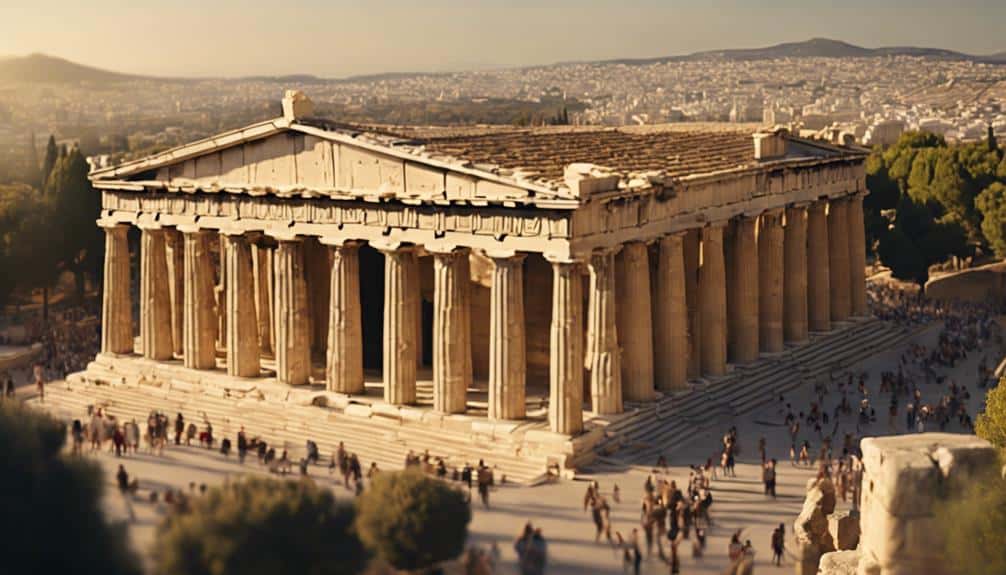The Golden Age of Athens in the 5th century BCE was a period of extraordinary artistic, intellectual, and scientific achievements that continue to shape our world today.
From the groundbreaking dramas of Sophocles and Euripides to the architectural splendor of the Parthenon and the pioneering philosophies of Socrates and Plato, this era offers a rich tapestry of innovation and cultural brilliance awaiting further exploration.
Art and Theater
Athens' Golden Age saw art and theater deeply embedded in their culture, with citizens flocking to dramatic performances and admiring architectural marvels that still captivate us today. This period highlighted Athens as an artistic and intellectual hub.
Art and architecture flourished, with structures like the Parthenon symbolizing their sophisticated design and craftsmanship. These architectural feats weren't merely for aesthetics but also reflected the city's values and religious devotion.
In the domain of poetry and drama, Athens set a high standard. Renowned playwrights like Euripides and Sophocles delivered compelling narratives that explored human nature and societal issues. Their works were performed in open-air theaters where performers wore masks, enhancing their ability to portray multiple characters and emotions.
The semicircular arrangement of the audience allowed for better acoustics and engagement, ensuring that every spectator could immerse themselves in the performance.
These cultural elements weren't just entertainment; they were a means for Athenians to reflect on life, politics, and morality. The integration of art and theater into daily life demonstrated a society that valued intellectual and emotional exploration, making the Golden Age a pivotal moment in cultural history.
Historical Preservation

Frequently, historical preservation in the Golden Age of Athens was driven by a meticulous dedication to documenting and analyzing past events, guaranteeing that future generations could learn from their achievements and mistakes. Herodotus, often called the father of history, played a crucial role in this endeavor. His accounts provided a detailed view of the Greco-Persian Wars, combining factual reporting with narrative storytelling.
Thucydides took a more analytical approach. By documenting the Peloponnesian War, he emphasized the importance of understanding the causes and consequences of conflict. His detailed records of speeches, military strategies, and political maneuvers offer invaluable insights into Athenian society and governance.
Xenophon contributed to this rich tradition with his extensive writings on various subjects, including tactics, politics, and horse breeding. His works, such as 'Anabasis,' provide a practical perspective on Greek history and military practices.
The Athenians' commitment to preserving history was more than an academic exercise; it was an essential part of their cultural identity. By recording their triumphs and tribulations, they ensured that future generations could benefit from their experiences, fostering a society deeply rooted in knowledge and reflective learning.
Philosophy

During the Golden Age of Athens, the field of philosophy flourished as thinkers like Socrates, Plato, and others engaged in rigorous debates and sought to understand the nature of truth and wisdom.
Socrates, a central figure in Athenian philosophy, introduced the Socratic method of teaching—engaging students in dialogue to stimulate critical thinking and illuminate ideas. His relentless questioning of conventional wisdom laid the foundation for Western thought.
Plato, a student of Socrates, expanded on his mentor's ideas and produced extensive works on philosophy, politics, and ethics. In 'The Republic,' Plato explored concepts of justice, governance, and the ideal state, profoundly influencing subsequent Western thought. His establishment of the Academy also institutionalized the pursuit of knowledge and intellectual discourse.
Philosophical discussions were integral to Athenian society, often taking place in public venues like the Agora and the Stoa of Attalos. These debates encouraged critical self-examination and the relentless search for truth. The term 'philosophy' itself, derived from the Greek for 'love of wisdom,' encapsulates this intellectual endeavor.
Therefore, Athenian philosophy emphasized critical thought and inquiry, shaping the intellectual landscape of the Golden Age and beyond.
Science and Medicine

Building on the intellectual fervor of philosophy, the Golden Age of Athens also witnessed groundbreaking advancements in science and medicine, epitomized by figures like Hippocrates and Pythagoras. In Ancient Greece, particularly Athens, these scientific advancements revolutionized how people understood and interacted with the natural world.
Hippocrates, often hailed as the father of modern medicine, applied logical reasoning to diagnose and treat patients effectively. His approach moved away from supernatural explanations for illness, laying the groundwork for clinical practices still in use today.
Pythagoras, although primarily known for his contributions to mathematics, also influenced scientific thought. His emphasis on numerical relationships extended beyond geometry, impacting various scientific disciplines. By establishing a systematic framework for understanding the world, Pythagoras' theories encouraged further inquiry and innovation.
In Athens, these advancements weren't isolated. They were part of a broader intellectual movement that included significant contributions from other scientists and thinkers. This environment fostered a culture where empirical observation and logical analysis were paramount.
Consequently, the scientific and medical progress achieved during this period in Ancient Greece set foundational principles that continue to underpin modern science and medicine, demonstrating the enduring legacy of Athens' Golden Age.
Math Contributions

The Golden Age of Athens produced groundbreaking mathematical contributions from figures like Pythagoras, Euclid, and Archimedes, whose theories and principles remain essential to modern education and scientific understanding.
Pythagoras developed the Pythagorean theorem, a^2 + b^2 = c^2, which is fundamental in calculating the relationship between the sides of a right triangle. This theorem still underpins much of geometry and trigonometry today.
Euclid, another prominent mathematician, introduced an extensive collection of geometric concepts through his seminal work, Elements. His systematic approach to geometry laid the foundation for what we now call Euclidean geometry, which is still a standard part of mathematical curricula worldwide.
Archimedes, celebrated for his innovative contributions, explained the principles of lever and pulley systems, which revolutionized mechanical engineering. Additionally, he accurately calculated Pi (π), a critical constant in mathematics, and made significant advances in solid geometry and physics.
These mathematical advancements from Athens have endured through centuries, shaping modern education and scientific understanding.
Pericles' Leadership

Pericles frequently demonstrated exceptional leadership qualities that propelled Athens into a period of unprecedented cultural and political prosperity. His vision and strategic initiatives were pivotal in defining the Golden Age of Athens.
One of Pericles' significant contributions was the construction of the Parthenon on the Acropolis, a symbol of Athenian artistic achievement and architectural prowess. This undertaking not only showcased the city's dedication to the arts but also provided employment, stimulating the local economy.
Moreover, Pericles strengthened the Athenian Navy, making it one of the most formidable maritime forces of the time. This naval power was vital during the Peloponnesian War, enabling Athens to exert influence and control over the Aegean Sea and beyond. The navy's dominance also facilitated trade and secured the safety of Athenian territories.
Pericles' leadership wasn't just about military prowess; his policies fostered a thriving cultural environment. By promoting public works and arts, he helped transform Athens into a hub of intellectual and artistic innovation.
This era of flourishing arts and sciences is a tribute to Pericles' forward-thinking governance and unwavering commitment to the betterment of Athens. His legacy remains a cornerstone of what we recognize today as the Golden Age of Athens.
Athenian Democracy

In ancient Athens, male citizens had the unprecedented opportunity to directly engage in governance through the Assembly, shaping the city's laws and policies. In Athenian democracy, the Assembly was the cornerstone, enabling citizens to debate, vote, and influence decisions. This direct participation was a significant departure from other contemporary governance systems, which were typically oligarchic or monarchic.
Under Pericles' leadership, democracy in Athens reached its zenith. Pericles championed civic engagement and public discourse, encouraging citizens to take an active role in political life. He introduced reforms that expanded participation and guaranteed that even the poorest citizens could serve in public offices. This inclusivity strengthened the democratic process, making it more representative of the populace.
The practice of ostracism was another unique feature of Athenian democracy. Citizens could vote to exile a person deemed a threat to the state for ten years, a measure designed to safeguard against tyranny and maintain civic harmony.
Athenian democracy's influence extended far beyond its time, serving as a model for modern democratic systems. The principles of direct participation, civic responsibility, and public debate pioneered in ancient Athens resonate in democratic governments around the world today.
Cultural Achievements

During its Golden Age, Athens became a center of unparalleled artistic and intellectual activity, fostering advancements in poetry, drama, architecture, and philosophy.
The city's theaters brimmed with Athenian audiences keen to witness performances by famous playwrights like Euripides and Sophocles. These writers, through their powerful dramas, explored profound human emotions and societal issues. They performed on stages in semicircles, wearing masks to project their voices and convey different characters.
Athenian architecture and sculpture reached new heights during this period. The Parthenon, an enduring symbol of Greek architectural brilliance, exemplifies the era's aesthetic values and technical prowess. Sculptures, often depicting gods, athletes, and everyday scenes, showcased the Greek commitment to beauty and realism.
Philosophy flourished as notable figures like Socrates and Plato emerged, laying the groundwork for Western thought. Socrates' method of questioning and Plato's written dialogues significantly influenced philosophical inquiry. The term 'philosophy,' derived from a Greek word meaning 'the love of wisdom,' underscores the intellectual fervor that characterized Athens.
These cultural achievements not only enriched Athenian society but also left a lasting legacy that continues to influence art, drama, and philosophy worldwide.
Economic Prosperity

Athenian economic prosperity soared as expanded trade routes and silver mines bolstered the city's wealth. The discovery and exploitation of rich silver mines in Laurium greatly contributed to Athens' financial growth. By extracting vast amounts of silver, Athens could mint coins, which played a pivotal role in standardizing coinage. This standardization simplified economic transactions, making trade more efficient and reliable.
You'd find that the expansion of trade routes was essential in this economic boom. Athens capitalized on its strategic location, connecting with regions across the Mediterranean. These routes facilitated the exchange of goods, ideas, and culture, bringing immense wealth to the city. Agricultural surplus also played a significant role, as the fertile land surrounding Athens produced excess crops. This surplus supported not just local needs but also trade with other city-states.
Marketplaces, or agoras, in Athens became bustling hubs of economic activity. Here, you'd see a diverse range of goods and services, and the standardized coinage allowed for smoother transactions. These economic exchanges were crucial, as they supported Athens' population growth and urban development.
Lasting Legacy

You can see the lasting legacy of Athens' Golden Age in modern democratic principles and cultural contributions.
The Athenian model of democracy has influenced contemporary political systems, while their advancements in art, drama, and science continue to inspire.
This period's achievements set enduring standards for intellectual and artistic excellence that still shape our society.
Influence on Modern Democracy
The democratic principles developed in Athens' Golden Age have profoundly shaped the structure and functioning of modern democracies. Athens' democratic principles, particularly citizen participation in decision-making, laid the foundation for contemporary democratic governance. Modern political systems still rely on these early concepts of direct involvement, emphasizing the importance of each individual's voice in the governing process.
Athens' influence can be pinpointed through several key elements:
- Citizen Participation: The Athenian model of direct democracy, where citizens actively engaged in legislative and judicial functions, set a precedent for modern representative democracies, ensuring that citizens have a say in governance.
- Concepts of Citizenship and Equality: Athens emphasized the idea that all citizens should have equal rights and responsibilities. This principle is foundational in modern political systems, where equality before the law is a cornerstone of democratic societies.
- Rule by Law: The Athenians established a legal framework that governed both rulers and the ruled, a practice that has been integral to maintaining order and justice in contemporary democracies.
Pericles' leadership during this era further solidified these democratic ideals, leaving a lasting legacy that continues to influence the structure and ethos of modern governments.
Enduring Cultural Contributions
Many cultural contributions from Athens' Golden Age continue to shape various facets of modern Western society. The architectural marvel of the Parthenon stands as a tribute to ancient Greek aesthetics, influencing countless public buildings and monuments. Its Doric columns and intricate sculptures are emulated in structures worldwide, symbolizing the enduring legacy of classical design.
Philosophers like Socrates and Plato laid the foundation for Western philosophy. Their inquiries into ethics, politics, and epistemology remain central to contemporary philosophical discourse. Socratic methods of questioning and Platonic ideals of forms are integral to modern educational curricula, cultivating critical thinking.
In drama, the works of Sophocles and Euripides are still performed and studied, showcasing the timeless human themes explored in ancient Greek theater. These playwrights introduced complex characters and moral dilemmas that resonate with audiences today.
Scientific and mathematical advancements from this era, such as the Pythagorean theorem and Euclidean geometry, form the bedrock of modern scientific education. These principles underpin various fields, from engineering to computer science, highlighting their lasting relevance.
Athens' Golden Age bequeathed a rich cultural heritage, influencing literature, philosophy, and the arts, and continues to shape our world profoundly.


